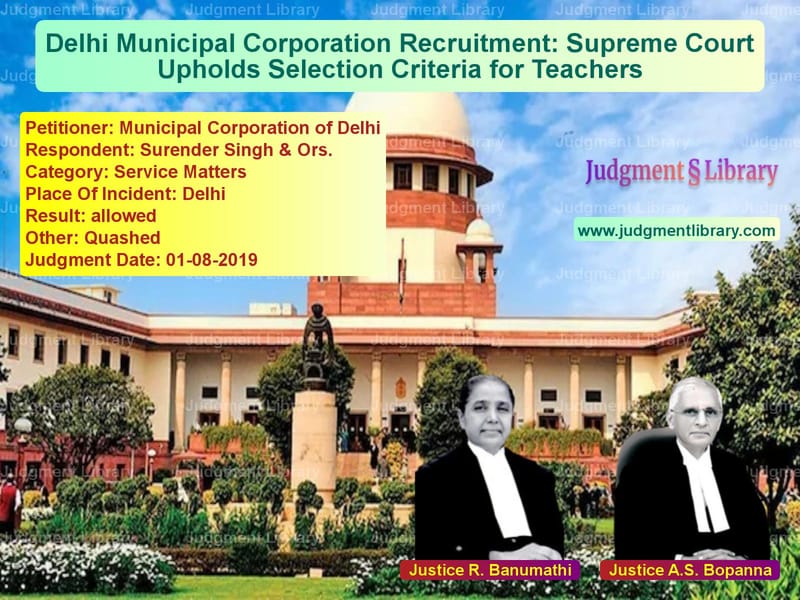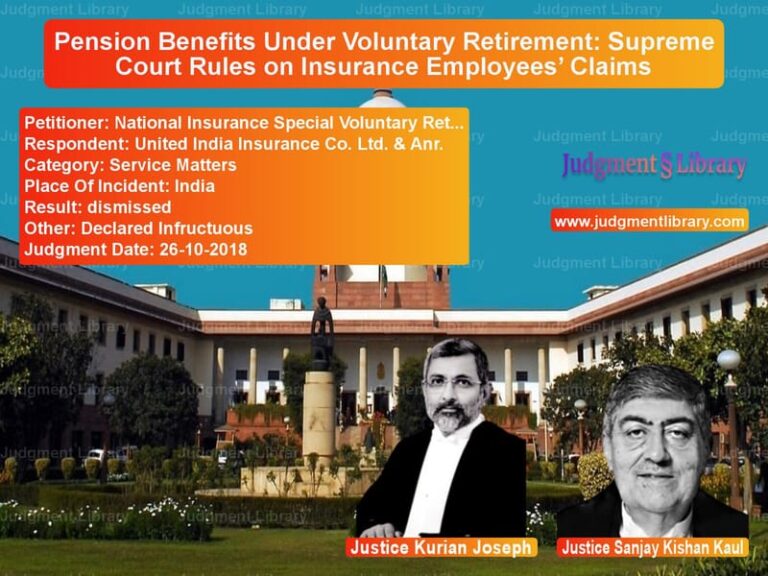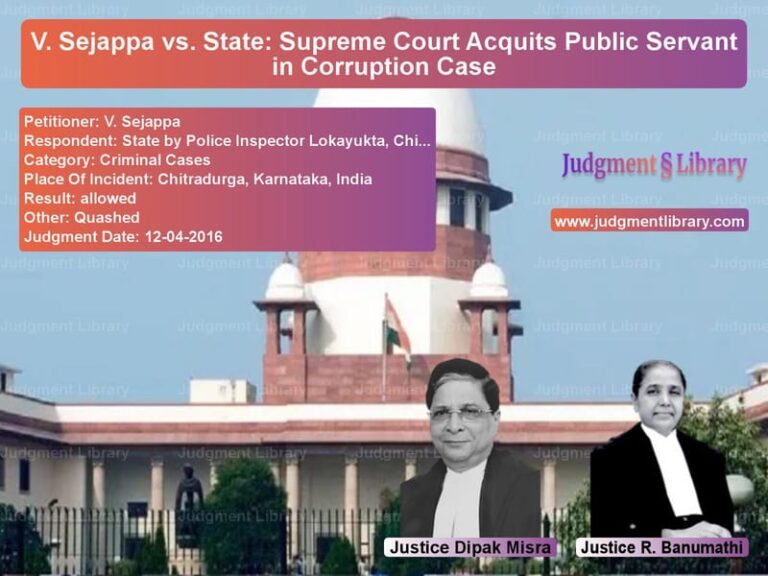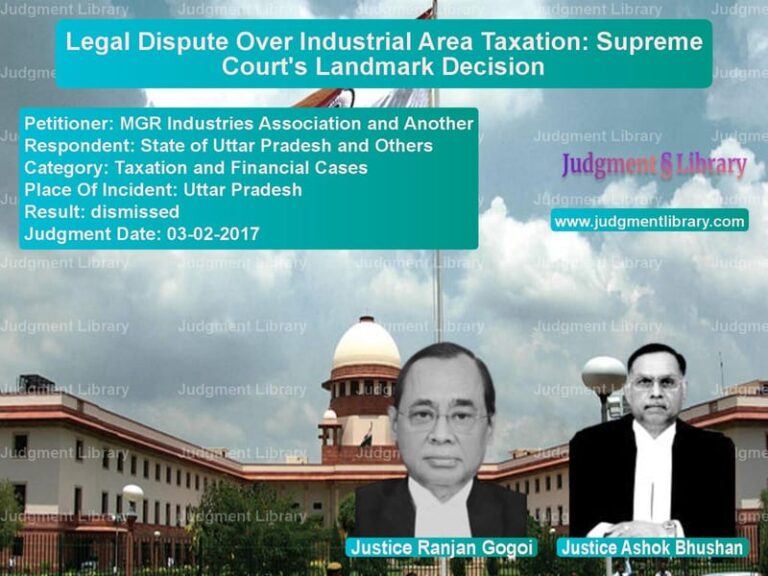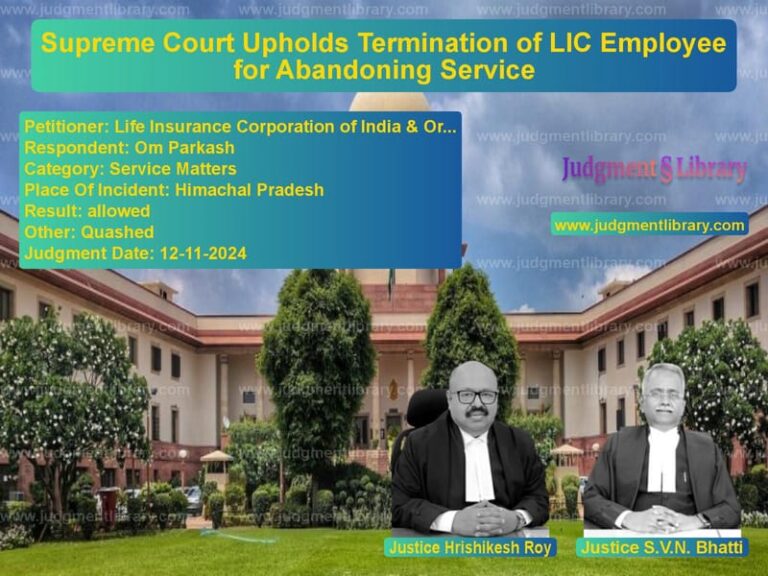Delhi Municipal Corporation Recruitment: Supreme Court Upholds Selection Criteria for Teachers
The Supreme Court of India, in its judgment dated August 1, 2019, addressed a critical issue concerning the recruitment process for Assistant Teachers (Primary) in the Municipal Corporation of Delhi (MCD). The case, Municipal Corporation of Delhi v. Surender Singh & Ors., revolved around the validity of minimum qualifying marks set by the Delhi Subordinate Services Selection Board (DSSSB) for teacher recruitment and whether the selection process violated any legal rights.
The Court ruled in favor of the MCD, emphasizing that recruitment authorities have the discretion to set minimum qualifying marks and that judicial interference in executive decisions regarding selection criteria should be limited.
Background of the Case
The dispute arose from an advertisement (No.1/2006) issued by the DSSSB for recruiting Assistant Teachers in MCD schools. Initially, 3348 vacancies were announced, but this number was later revised to 2348. The selection process included a written examination held on July 2, 2006.
Several candidates, including the respondents, failed to qualify and challenged the recruitment process before the Delhi High Court, arguing that the DSSSB had arbitrarily introduced minimum qualifying marks post-examination, which was not specified in the initial advertisement.
Petitioner’s Arguments (Municipal Corporation of Delhi)
The MCD, represented by its counsel, put forth the following arguments:
- Minimum qualifying marks ensure quality: The selection process aimed to recruit the best candidates, and DSSSB had the discretion to set cut-off marks.
- No legal violation: There was no statutory obligation to disclose cut-off marks before the examination.
- Judicial interference is unwarranted: The setting of qualifying marks is an administrative decision best left to recruitment agencies.
Respondent’s Arguments (Surender Singh & Ors.)
The respondents countered these claims, stating:
- Unfair selection process: The DSSSB failed to notify candidates about the minimum marks required, making the process arbitrary.
- Violation of prior court rulings: A previous Delhi High Court ruling in Kuldeep Singh & Ors. v. DSSSB had held that recruitment processes must be transparent.
- Failure to fill vacancies: More than 60 vacancies remained unfilled despite candidates scoring slightly below the final cut-off.
Supreme Court’s Observations
The Supreme Court examined the validity of DSSSB’s selection criteria and made several key observations:
1. Recruitment Agencies Have Discretion in Fixing Qualifying Marks
The Court upheld the DSSSB’s right to set qualifying marks, stating:
“The recruiting agency has full discretion to fix minimum qualifying marks for selection to ensure the best talent is recruited.”
2. No Prior Disclosure of Cut-Off Marks Is Required
The Court rejected the argument that the minimum marks should have been declared before the examination, holding:
“The absence of a prior announcement regarding minimum marks does not invalidate the selection process.”
3. Filling Vacant Posts Is Not Mandatory
The judgment emphasized that an employer is not obligated to fill all available vacancies:
“The employer has the discretion to decide how many candidates to recruit, and courts should not interfere with merit-based selection.”
4. Judicial Review Should Not Extend to Selection Criteria
The Court warned against excessive judicial interference in recruitment policies, stating:
“The setting of minimum marks is an administrative function, and courts should refrain from interfering unless the process is patently arbitrary or illegal.”
Final Verdict
The Supreme Court allowed the appeal and set aside the Delhi High Court’s order, ruling that:
- The DSSSB acted within its powers in setting minimum qualifying marks.
- The recruitment process was not discriminatory.
- Vacancies left unfilled due to the qualifying criteria could not be a basis for legal action.
Impact of the Judgment
This ruling has significant implications for government recruitment processes:
- Strengthening Merit-Based Selection: It affirms the right of recruiting agencies to set high selection standards.
- Restricting Judicial Overreach: Courts should not intervene in recruitment policies unless clear illegality is established.
- Clarity on Recruitment Rules: Future advertisements must clearly state whether qualifying marks will be applied.
Conclusion
The Supreme Court’s decision in Municipal Corporation of Delhi v. Surender Singh upholds the autonomy of recruitment agencies while ensuring fairness in selection processes. The ruling reinforces that minimum qualifying marks, even if introduced after an examination, are valid if applied uniformly.
By dismissing the challenge, the Court has provided a clear precedent that administrative discretion in recruitment must be respected, provided it is exercised fairly and without bias.
Petitioner Name: Municipal Corporation of Delhi.Respondent Name: Surender Singh & Ors..Judgment By: Justice R. Banumathi, Justice A.S. Bopanna.Place Of Incident: Delhi.Judgment Date: 01-08-2019.
Don’t miss out on the full details! Download the complete judgment in PDF format below and gain valuable insights instantly!
Download Judgment: Municipal Corporatio vs Surender Singh & Ors Supreme Court of India Judgment Dated 01-08-2019.pdf
Direct Downlaod Judgment: Direct downlaod this Judgment
See all petitions in Recruitment Policies
See all petitions in Public Sector Employees
See all petitions in Disciplinary Proceedings
See all petitions in Judgment by R. Banumathi
See all petitions in Judgment by A. S. Bopanna
See all petitions in allowed
See all petitions in Quashed
See all petitions in supreme court of India judgments August 2019
See all petitions in 2019 judgments
See all posts in Service Matters Category
See all allowed petitions in Service Matters Category
See all Dismissed petitions in Service Matters Category
See all partially allowed petitions in Service Matters Category

